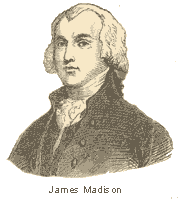Outgoing president Thomas Jefferson had attempted to smooth the way for his successor by repealing the Embargo of 1807 and setting the wheels in motion for the Non-Intercourse Act of 1809.
James Madison, however, quickly suffered a diplomatic embarrassment. Under the terms of Non-Intercourse, Britain announced its intention to honor American Neutral Rights, allowing the resumption of trade between the two countries. However, Britain quickly repudiated the treaty, leaving Madison with egg on his face and the object of scorn among his political opponents.
 Next, the Republican Congress enacted the truly strange Macon's Bill No. 2 (1810). Under this measure, the United States resumed trade with both Britain and France, but as soon as American demands for honoring neutral rights were met by one of the belligerents, then America would cut off trade with the other.
Napoleon quickly outsmarted Madison and the Republicans by formally declaring the end to his seizure of American shipping, forcing the United States to suspend trade with Britain. The French, however, continued to seize American ships, demonstrating Napoleon's duplicity and the seeming senselessness of the American policy.
In an ironic twist, England soon felt the loss of American trade and revoked its Orders in Council; the bizarre Macon's Bill No. 2 had actually accomplished its end. However, by the time word of the change in British policy arrived in the United States, Congress had already declared war on Britain.
Next, the Republican Congress enacted the truly strange Macon's Bill No. 2 (1810). Under this measure, the United States resumed trade with both Britain and France, but as soon as American demands for honoring neutral rights were met by one of the belligerents, then America would cut off trade with the other.
Napoleon quickly outsmarted Madison and the Republicans by formally declaring the end to his seizure of American shipping, forcing the United States to suspend trade with Britain. The French, however, continued to seize American ships, demonstrating Napoleon's duplicity and the seeming senselessness of the American policy.
In an ironic twist, England soon felt the loss of American trade and revoked its Orders in Council; the bizarre Macon's Bill No. 2 had actually accomplished its end. However, by the time word of the change in British policy arrived in the United States, Congress had already declared war on Britain.